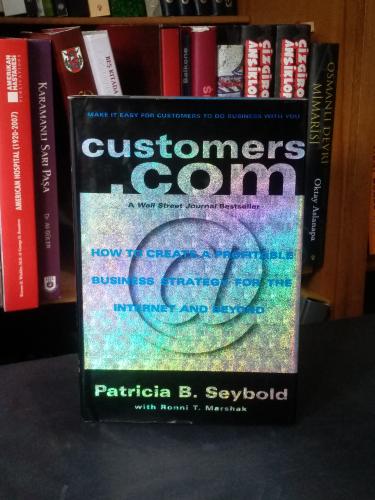Customers.com: How to Create a Profitable Business Strategy for the Internet and Beyond

Patricia Seybold is one of the few people with the credentials and experience to write the one book on electronic commerce everyone in business must read. Seybold has advised major companies not only on the technical requirements for a successful electronic commerce strategy, but also on the management, marketing, sales, and customer support systems necessary to create an infra-structure that seamlessly blends a company's e-commerce initiative with its overall business.
It all starts with customers. For the past several years, Seybold has been working with electronic commerce pioneers who have made life easier for their customers by figuring out what they want and designing their Internet strategy accordingly. Seybold's guide is packed with insights on how both Fortune 500 giants and smaller companies have created e-commerce initiatives that place them well ahead of their competitors. Some examples:
National Semiconductor made huge improvements to its bottom line by targeting the right customers (not always the ones who make the final buying decision) on its Web site.
Hertz coordinated its e-commerce strategy with its entire business so that it is now head and shoulders above its competitors in owning the customer's total experience.
The National Science Foundation streamlined its customers' business processes by involving all stakeholders in the development of its Web strategy.
Wells Fargo provides its customer sales and service representatives with a 360-degree view of its customers, providing one-stop shopping via the Web and making its on-line banking services the fastest-
growing part of the company.
iPrint transformed a commodity business by using the Web to let customers help themselves in designing the end product exactly as they want it.
Boeing designed its Web site to help customers do their jobs more effectively.
Dow Jones delivered personalized service with its electronic version of The Wall Street Journal, showing that customers will pay for information of value on the Internet.
Tripod grew from a start-up to a company with over a million members by fostering a vibrant on-line community.
With additional in-depth examples from American Airlines, Amazon.com, Babson College, Bell Atlantic, Dell Computer, PhotoDisc, General Motors, and Cisco Systems, Customers.com is an exceptionally rich source of ideas and information: the one book you need to stay in business in the rapidly changing era of electronic commerce.
Ciltli Çok Temiz
- Açıklama
Patricia Seybold is one of the few people with the credentials and experience to write the one book on electronic commerce everyone in business must read. Seybold has advised major companies not only on the technical requirements for a successful electronic commerce strategy, but also on the management, marketing, sales, and customer support systems necessary to create an infra-structure that seamlessly blends a company's e-commerce initiative with its overall business.
It all starts with customers. For the past several years, Seybold has been working with electronic commerce pioneers who have made life easier for their customers by figuring out what they want and designing their Internet strategy accordingly. Seybold's guide is packed with insights on how both Fortune 500 giants and smaller companies have created e-commerce initiatives that place them well ahead of their competitors. Some examples:
National Semiconductor made huge improvements to its bottom line by targeting the right customers (not always the ones who make the final buying decision) on its Web site.
Hertz coordinated its e-commerce strategy with its entire business so that it is now head and shoulders above its competitors in owning the customer's total experience.
The National Science Foundation streamlined its customers' business processes by involving all stakeholders in the development of its Web strategy.
Wells Fargo provides its customer sales and service representatives with a 360-degree view of its customers, providing one-stop shopping via the Web and making its on-line banking services the fastest-
growing part of the company.
iPrint transformed a commodity business by using the Web to let customers help themselves in designing the end product exactly as they want it.
Boeing designed its Web site to help customers do their jobs more effectively.
Dow Jones delivered personalized service with its electronic version of The Wall Street Journal, showing that customers will pay for information of value on the Internet.
Tripod grew from a start-up to a company with over a million members by fostering a vibrant on-line community.
With additional in-depth examples from American Airlines, Amazon.com, Babson College, Bell Atlantic, Dell Computer, PhotoDisc, General Motors, and Cisco Systems, Customers.com is an exceptionally rich source of ideas and information: the one book you need to stay in business in the rapidly changing era of electronic commerce.Ciltli Çok Temiz
Stok Kodu:16067296835939Basım Tarihi:1998
- Taksit Seçenekleri
 Taksit SayısıTaksit tutarıGenel ToplamTek Çekim135,00135,00270,20140,40347,70143,10624,30145,80916,50148,50
Taksit SayısıTaksit tutarıGenel ToplamTek Çekim135,00135,00270,20140,40347,70143,10624,30145,80916,50148,50
- Yorumlar
- Yorum yazBu kitabı henüz kimse eleştirmemiş.
